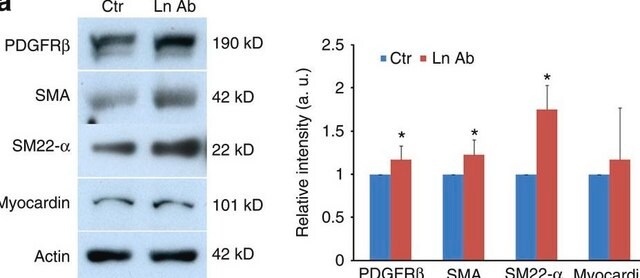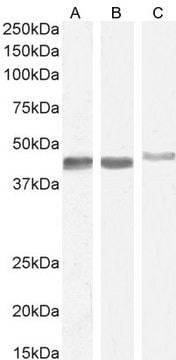A2547
Monoclonal Anti-Actin, α-Smooth Muscle
clone 1A4, ascites fluid
Synonym(s):
Alpha Smooth Muscle Actin Antibody - Monoclonal Anti-Actin, α-Smooth Muscle, Alpha Smooth Muscle Actin Antibody Sigma, Anti-Alpha Smooth Muscle Actin Antibody, SMA
About This Item
Recommended Products
biological source
mouse
Quality Level
conjugate
unconjugated
antibody form
ascites fluid
antibody product type
primary antibodies
clone
1A4, monoclonal
mol wt
antigen ~42 kDa
contains
15 mM sodium azide
species reactivity
human, mouse, rat, chicken, frog, canine, rabbit, guinea pig, goat, bovine, sheep, snake
technique(s)
immunohistochemistry (formalin-fixed, paraffin-embedded sections): suitable using smooth muscle cells
immunohistochemistry (frozen sections): suitable using smooth muscle cells
indirect immunofluorescence: 1:400 using blood vessels in sections of human appendix
western blot: suitable using smooth muscle cells
isotype
IgG2a
UniProt accession no.
application(s)
research pathology
shipped in
dry ice
storage temp.
−20°C
target post-translational modification
unmodified
Gene Information
human ... ACTA2(59)
mouse ... Acta2(11475)
rat ... Acta2(81633)
Looking for similar products? Visit Product Comparison Guide
General description
Mouse monoclonal anti-actin, α-smooth muscle antibody binds to actin from human, mouse, rat, bovine, chicken, frog, goat, guinea pig, rabbit, dog, sheep, and snake.
Monoclonal Anti-α Smooth Muscle Actin (mouse IgG2a isotype) is derived from the hybridoma produced by the fusion of mouse myeloma cells and splenocytes from an immunized mouse. The NH2 terminal synthetic decapeptide of α-smooth muscle actin coupled to keyhole limpet hemocyanin (KLH) was used as the immunogen. The isotype is determined using Sigma ImmunoTypeTM Kit (Sigma Stock No. ISO-1) and by a double diffusion immunoassay using Mouse Monoclonal Antibody Isotyping Reagents (Sigma Stock No. ISO-2).
Specificity
Immunogen
Application
Monoclonal Anti-Actin, α-Smooth Muscle antibody has been used in the detection of actin 2 in breast fibroblasts using immunofluorescence staining.
IHC analysis of x-gal stained muouse cardiac tissue was performed using the primary antibody, mouse monoclonal anti-smooth muscle actin to identify myofibroblasts.
Biochem/physiol Actions
Mutations in actin 2 is associated with dysfunction of smooth muscles in arteries and is implicated in coronary heart disease. Mutations in ACTA2 contributes to tear and enlargement of aorta in thoracic aortic aneurysms (TAAD).
Physical form
Storage and Stability
Other Notes
Disclaimer
Not finding the right product?
Try our Product Selector Tool.
related product
Storage Class Code
10 - Combustible liquids
WGK
WGK 1
Flash Point(F)
Not applicable
Flash Point(C)
Not applicable
Certificates of Analysis (COA)
Search for Certificates of Analysis (COA) by entering the products Lot/Batch Number. Lot and Batch Numbers can be found on a product’s label following the words ‘Lot’ or ‘Batch’.
Already Own This Product?
Find documentation for the products that you have recently purchased in the Document Library.
Customers Also Viewed
Our team of scientists has experience in all areas of research including Life Science, Material Science, Chemical Synthesis, Chromatography, Analytical and many others.
Contact Technical Service













